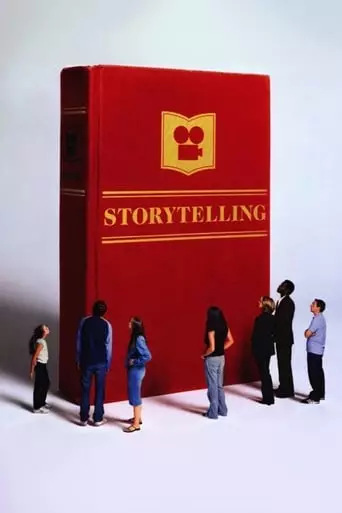
Storytelling (2001) Watch Online Free
College and high school serve as the backdrop for two stories about dysfunction and personal turmoil.
Storytelling is a 2001 film directed by Todd Solondz, renowned for his satirical and often provocative narratives. The film is divided into two distinct segments: Fiction and Non-Fiction, each exploring different facets of human relationships and societal issues.
Fiction
In the Fiction segment, Vi, a graduate student, is in a relationship with Marcus, an undergraduate with cerebral palsy. Their relationship faces challenges, particularly when Marcus shares a personal story in a creative writing class, leading to criticism from their professor, Mr. Scott, and his favorite student, Catherine. This criticism strains their relationship, prompting Vi to seek solace in Mr. Scott, resulting in a complex and morally ambiguous encounter. Vi later attempts to process this experience by writing a fictionalized account, which is met with further criticism, highlighting the blurred lines between fiction and reality.
Non-Fiction
The Non-Fiction segment follows Toby Oxman, an aspiring filmmaker attempting to create a documentary about teenagers’ experiences post-Columbine. Due to resource constraints, he focuses on the dysfunctional Livingston family. The family dynamics are strained, with each member exhibiting self-centered behaviors. Toby’s documentary inadvertently exposes the family’s flaws, leading to tragic consequences, including the family’s demise at the hands of their housekeeper, Consuelo. The film concludes with a satirical twist, as the surviving family member, Scooby, remains indifferent to the tragedy, viewing it as an opportunity for fame.
Storytelling delves into the complexities of storytelling, examining how personal experiences are transformed into fiction. The film challenges the audience to question the authenticity of narratives and the ethical implications of representing real-life events through fiction.
The film explores how individuals seek validation and the effects of criticism on personal and creative growth. Characters like Vi and Marcus grapple with the consequences of external feedback, highlighting the vulnerability and resilience inherent in the creative process.
Through Toby’s documentary and the portrayal of the Livingston family, the film critiques how media can dehumanize individuals, reducing them to mere subjects for entertainment. This theme underscores the ethical responsibilities of storytellers in representing real people and events.
Storytelling offers a satirical look at suburban life, exposing the superficiality and moral decay beneath the facade of privilege. The film critiques societal norms and the often unspoken dysfunctions within seemingly perfect communities.
Upon its release, Storytelling received mixed reviews from critics and audiences. Some praised its bold narrative and satirical approach, while others criticized its bleakness and episodic structure. The film’s unflinching portrayal of uncomfortable truths and its challenge to traditional storytelling conventions sparked discussions about its artistic merit and social commentary. Despite the mixed reception, Storytelling has been recognized for its daring exploration of complex themes and its contribution to the discourse on the ethics of representation in media.
Storytelling employs a unique episodic format, presenting two distinct yet interconnected stories. This structure keeps the audience engaged and encourages reflection on the overarching themes, offering a fresh perspective on storytelling.
The film offers a sharp critique of societal norms, particularly the dehumanization inherent in media representation and the moral complexities of suburban life. Its satirical tone invites viewers to question and reflect on these issues.
The characters are multifaceted and undergo significant development, providing a deep exploration of human nature. Their journeys are both compelling and thought-provoking, offering insights into personal and societal struggles.
Storytelling does not shy away from exploring the ethical boundaries of fiction and media representation. It challenges the audience to consider the responsibilities of storytellers and the impact of their narratives on real lives.
The cast delivers compelling performances, bringing depth and authenticity to their roles. Their portrayals effectively convey the film’s complex themes and emotional nuances, enhancing the overall impact of the narrative.
The film delves into complex themes such as the nature of fiction, the impact of criticism, and the ethics of media representation. These themes encourage viewers to engage in deeper reflection and discussion.
Despite mixed initial reviews, Storytelling has developed a cult following and received critical acclaim for its originality and boldness. Its unique approach to filmmaking makes it a noteworthy addition to contemporary cinema.
After watching Storytelling, you may experience a range of emotions, from discomfort to introspection. The film’s unflinching portrayal of uncomfortable truths can be unsettling, yet it also offers moments of dark humor and insight. You might find yourself reflecting on the themes of fiction, media representation, and societal norms, considering how they manifest in your own life. The film’s open-ended nature may leave you with lingering questions and a sense of contemplation about the ethical responsibilities of storytellers and the impact of their narratives. Overall, Storytelling offers a thought-provoking and emotionally complex experience that challenges conventional storytelling and invites viewers to engage with its deeper themes.
